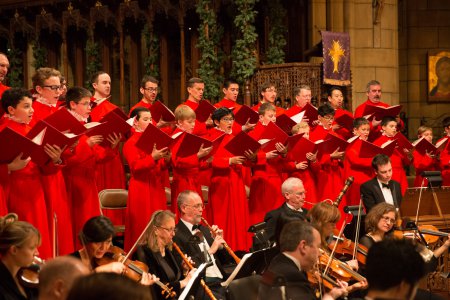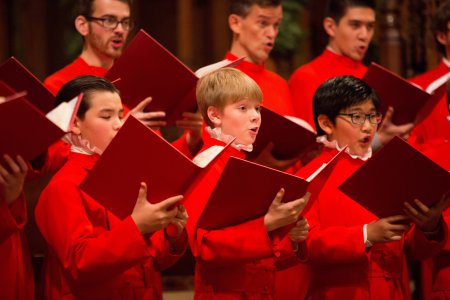The Saint Thomas Choir of Men and Boys with Concert Royal: Music of Bach and Handel
An evening of superb sacred choral music, highlighted by a fabulous performance of a deservedly well-loved Baroque masterpiece.

The Saint Thomas Choir of Men and Boys with Concert Royal (Photo credit: Courtesy of Saint Thomas Church)
[avatar user=”Jean Ballard Terepka” size=”96″ align=”left” ] Jean Ballard Terepka, Music Critic[/avatar]The last concert of the St. Thomas Choir of Men and Boys 2015-2016 season fell between the liturgical feasts of Ascension and Pentecost. These are emotionally complex days in the Christian calendar. On the day of the Ascension, loss and triumph are combined for Jesus’ disciples as they bid a final good-bye to their beloved Master when he finally leaves them after the Resurrection. On Pentecost, when the disciples are given the gift of tongues, the encouragement to use all their individual gifts in service to their faith, and the mission to carry God’s word throughout the known world, they are so filled with thrilled excitement and happily anxious anticipation that bystanders think they’re drunk rather than filled with the Holy Spirit.
Such feast days deserve magnificent music; Bach and Handel created it. And the Saint Thomas Choir of Men and Boys, the first rate period-instruments Concert Royal, and five marvelous soloists gave splendid performances of two Bach cantatas and a Handel psalm-setting that did both the feast days and the music proud. The first-rate concert was a particularly fine accomplishment for St. Thomas Church: rocked by the sudden death last summer of John Scott, choral director and organist, the school and the church had to both manage a top-knotch concert season without their director and perform the “director-less” concerts as suitable memorials to Scott.
Earlier first-rate concerts in the season were guest conducted by Andrew Nethsingha. This last concert was guest conducted by the New York organist and church musician, now serving as Principal Organist at St. Ignatius Loyola and Assistant Organist at Temple Emanu-El. As the Saint Thomas rector, the Reverent Canon Carl F. Turner noted with pleasure in his opening welcome, a few in the audience might recognize Daniel Beckwith as a “former gentleman of our choir.” And Beckwith did indeed seem entirely at home as he conducted, elicited from both the instrumentalists of the Concert Royal and all the singers their very best efforts.
Bach’s early cantata Gottes Zeit ist die allerbeste Zeit, sometimes called the Actus Tragicus, is an exploration of mourning as a form of blessing, a movement of the spirit from grief to life-filled affirmation. Each individual soloist-voice successfully – briefly – carried a moment in the psychological transformation from sadness to grateful recognition of God’s salvation. The beautiful voice of soprano Shannon Mercer predicted the goodness of the life that will come after the death of the faithful; in tenor Steven Caldicott Wilson’s request for God’s wisdom in confonting death’s inevitability, a sense of transformative intimacy emerged from his warm, generous voice. Baritone Jesse Blumberg’s declarations about Paradise in Heute wirst du mit mir im Paradies sein were compellingly beautiful: in the versatility of his deep, flexible voice, Blumberg replicated the movement of the soul from earth to heaven.
In this conservative cantata whose style evokes earlier sacred choral writing, the chorus and orchestra alike serve to support the soloists. In the second work of the evening, Bach’s much later Lobet Gott in seinen Reichen, both chorus and orchestra have functions – both theological and musical – fully equal to those of the soloists. Trumpets and tympani both open and close the work providing a secure and stirring architecture of triumph and optimism; the choir embodied happiness at its most expansive.
Alto Kirsten Solleck inhabited the complex aria Ach, bleibe doch, mein liebstes Leben so completely that she gave it a “plot,” an emotional development: an imprecation to God that the newly resurrected Jesus not be swiftly removed after his miraculous reappearance became the story of a woman grappling with puzzlement and betrayal as she works, by means of prayer, to turn her own anguish into acceptance. Soprano Yulia Van Doren’s exultant and virtuosic Jesu, deine Gnadenblicke was ravishing: she treated trills and ornamentation details as occasions to scatter stars into the night sky.

St. Thomas Boys Choir (Courtesy of St. Thomas Church)
This cantata marks the unstoppable moment of change for the followers of Christ. The disciples themselves become the religious leaders who themselves will have disciples: this is the day when the “church” is born and this cantata, at once briskly sunny and profoundly triumphant, makes this mystery joyful.
The Bach cantatas were indeed wonderful, but the evening belonged to Handel and to his 1707 Dixit Dominus. This is Baroque rock-n-roll at its heady, improbable best. The Psalm 110 text brings together martial swagger, priestly certitude and lurid prophetic vision. In its first, ancient Jewish context, this psalm is about God’s triumphant preservation of his beloved Israel; in Counter-Reformation Catholicism, this is the implacably, aggressively confident language of both secular coronation and priestly ordination. For the up-and-coming young Handel, only recently emerged from his teenage years and ready to make his mark on the Roman music scene, this dynamically virtuosic Dixit Dominus embodies a giddily ebullient, viscerally optimistic young masculinity.
What better vehicle for the happy, vigorous energies of the Saint Thomas Men and Boys? Handel’s writing for the instruments and the soloists is consistently brilliant, but the choral writing is especially richly nuanced, ranging from subtly evoked traditions of conservative harmonies to wildly bold fugues. The soloists, though singing marvelously – Sollek, especially, was like an exotic Amazon plopped into a stunned Italian ecclesiastical palazzo – seemed to sense that this was the boys’ show, and they did everything they could to let them shine.
Especially for the now mature oldest of the young trebles, after a season – and a demanding school year – of singing and musical training, this was a fabulous performance. Rare musical excellence and uncontainable exuberance made of the choral “implebit ruinas” the most gorgeous possible team-spirit fight song: happy, happy boys!
Scott’s death made this a difficult season to pull off; however, St. Thomas’ lay, clergy and music staff leadership, combined with the commitment and energy of guest conductors, made it first rate. This achievement is a rare gift for both the immediate St. Thomas community and the larger New York musical audience; it is also a particularly fine example of successful professional collaboration in the face of the unexpected, an unanticipated additional lesson in the rich and remarkable curriculum which shapes the musical, intellectual and personal leadership training of the St. Thomas students.
The Saint Thomas Choir of Men and Boys with Concert Royal: Music of Bach and Handel (May 13, 2016)
Saint Thomas Church Fifth Avenue
1 West 53rd Street in Manhattan
For more information, see http://www.SaintThomasChurch.org
Running time: two hours with one intermission
An evening of superb sacred choral music, highlighted by a fabulous performance of a deservedly well-loved Baroque masterpiece.






Leave a comment